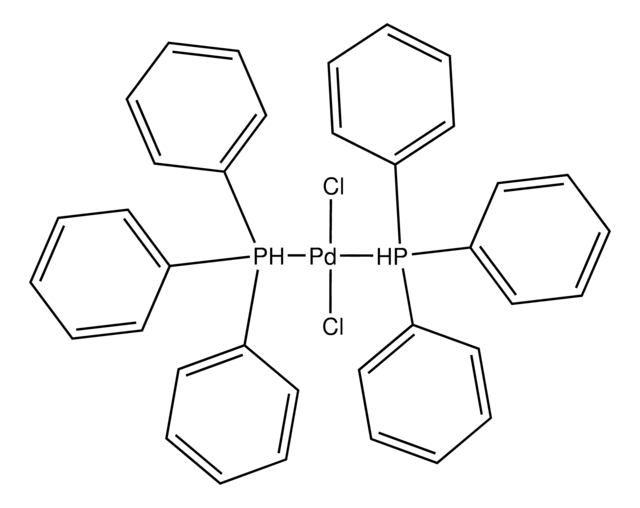Wszystkie zdjęcia(1)
Kluczowe dokumenty
655090
3-Methyl-1-butylboronic acid
Synonim(y):
Isopentylboronic acid
Zaloguj sięWyświetlanie cen organizacyjnych i kontraktowych
About This Item
Wzór empiryczny (zapis Hilla):
C5H13BO2
Numer CAS:
Masa cząsteczkowa:
115.97
Numer MDL:
Kod UNSPSC:
12352103
Identyfikator substancji w PubChem:
Polecane produkty
Formularz
solid
mp
80-91 °C
temp. przechowywania
2-8°C
ciąg SMILES
CC(C)CCB(O)O
InChI
1S/C5H13BO2/c1-5(2)3-4-6(7)8/h5,7-8H,3-4H2,1-2H3
Klucz InChI
UVMWVBMFEDQYRW-UHFFFAOYSA-N
Zastosowanie
Reactant for:
- Selective copper-promoted cross-coupling with aromatic amines
- Synthesis of indazole based analog sensitive Akt inhibitors
- Preparation of alkylarenes via tetraphosphine-palladium-catalyzed Suzuki cross-coupling with aryl halides
Inne uwagi
Contains varying amounts of anhydride
Ta strona może zawierać tekst przetłumaczony maszynowo.
Kod klasy składowania
13 - Non Combustible Solids
Klasa zagrożenia wodnego (WGK)
WGK 3
Temperatura zapłonu (°F)
Not applicable
Temperatura zapłonu (°C)
Not applicable
Środki ochrony indywidualnej
Eyeshields, Gloves, type N95 (US)
Wybierz jedną z najnowszych wersji:
Masz już ten produkt?
Dokumenty związane z niedawno zakupionymi produktami zostały zamieszczone w Bibliotece dokumentów.
Reuven Rasooly et al.
Journal of food protection, 75(5), 951-954 (2012-05-09)
The potential use of ricin as an agent of biological warfare highlights the need to develop fast and effective methods to detect biologically active ricin. The current "gold standard" for ricin detection is an in vivo mouse bioassay; however, this
Reuven Rasooly et al.
The Journal of biological chemistry, 287(33), 27924-27929 (2012-06-27)
Ricin is a highly toxic protein produced by the castor plant Ricinus communis. The toxin is relatively easy to isolate and can be used as a biological weapon. There is great interest in identifying effective inhibitors for ricin. In this
Reuven Rasooly et al.
Toxins, 5(8), 1447-1461 (2013-08-21)
Aflatoxin-producing fungi contaminate food and feed during pre-harvest, storage and processing periods. Once consumed, aflatoxins (AFs) accumulate in tissues, causing illnesses in animals and humans. Most human exposure to AF seems to be a result of consumption of contaminated plant
Reuven Rasooly et al.
PloS one, 8(8), e71682-e71682 (2013-08-14)
Gene expression in transduced mammalian cells correlates with virus titer, but high doses of vector for gene therapy leads to toxicity in humans and in animals. Changing the optimal tissue culture medium by adding low levels of environmental stressors, such
Lisa J Hill et al.
NPJ Regenerative medicine, 6(1), 3-3 (2021-01-09)
Fibrotic disease is a major cause of mortality worldwide, with fibrosis arising from prolonged inflammation and aberrant extracellular matrix dynamics. Compromised cellular and tissue repair processes following injury, infection, metabolic dysfunction, autoimmune conditions and vascular diseases leave tissues susceptible to
Nasz zespół naukowców ma doświadczenie we wszystkich obszarach badań, w tym w naukach przyrodniczych, materiałoznawstwie, syntezie chemicznej, chromatografii, analityce i wielu innych dziedzinach.
Skontaktuj się z zespołem ds. pomocy technicznej







